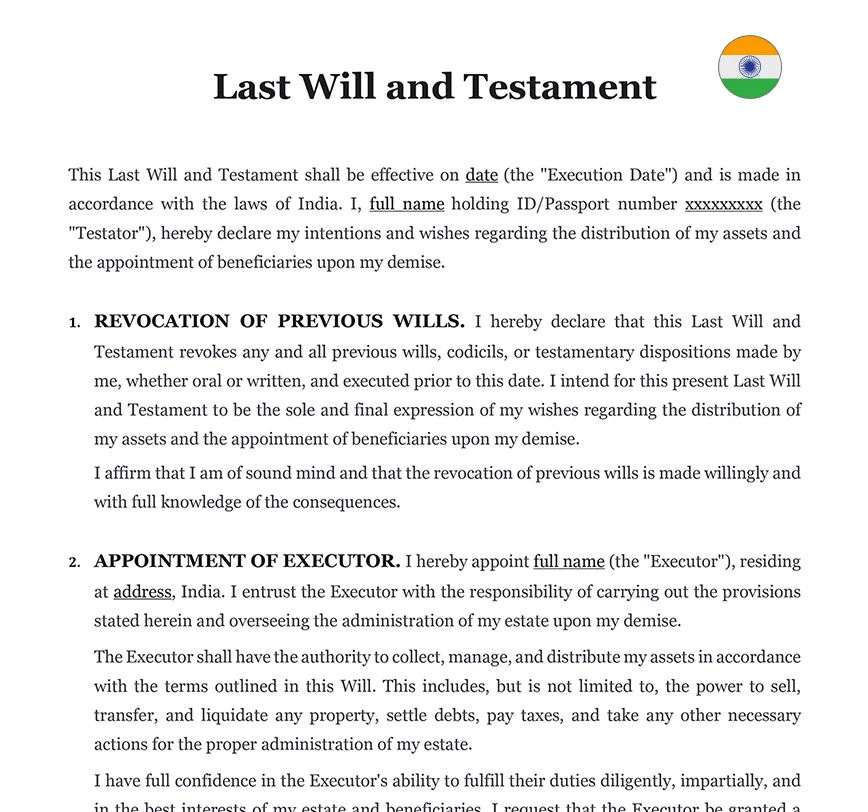Ready to use legal template
Drafted by experienced lawyers
Compliant with Indian law
Ready to use legal template
Drafted by lawyers
Compliant with Indian law
Home › Family Law › Testament
Learn more about Testament in India
A Testament, commonly referred to as a Will, is a legal document that outlines an individual’s wishes regarding the distribution of their assets after their death. It allows a person to designate beneficiaries, appoint guardians for minor children, and specify any final instructions for their estate. A Testament ensures that a person’s assets are distributed according to their wishes and provides clarity to their loved ones, minimizing potential conflicts and legal disputes. In India, the creation of a Testament is governed by specific legal procedures, and having a valid, properly executed Will is crucial to ensuring your estate is handled efficiently. Whether you have a simple estate or complex assets, a Testament is an essential part of sound estate planning. Download our Testament, easy to edit in Word format, drafted by experts to be used in India.
Table of contents
What is a Last Will and Testament?
Here are some key aspects of a testament:
Distribution of Assets: A testament outlines how the testator’s assets, such as real estate, money, investments, personal belongings, and other property, should be distributed upon their death. It allows the testator to specify who will receive what portion of their estate.
Appointment of Executors: The testament typically designates one or more executors, also known as personal representatives or administrators, who will be responsible for carrying out the instructions outlined in the will. Executors ensure that the testator’s wishes are fulfilled and handle the administrative tasks associated with settling the estate.
Appointment of Guardians: If the testator has minor children, a testament may include the appointment of guardians who will have the legal responsibility for their care and upbringing in the event of the testator’s death.
Specific Bequests and Legacies: A testament may include specific bequests or legacies, which are instructions for the distribution of particular items or sums of money to specific individuals or organizations. These could include sentimental items, charitable donations, or gifts to friends and family members.
Conditions and Provisions: A testament can contain specific conditions or provisions that must be met for beneficiaries to receive their inheritance. These conditions could include reaching a certain age, attaining certain milestones, or meeting specific requirements set by the testator.
Revocation and Amendments: A testament can be revoked or amended by the testator during their lifetime, as long as they have the legal capacity to do so. This allows the testator to update their will to reflect changes in their circumstances, relationships, or preferences.
It’s important to note that the specific requirements and laws governing testaments can vary between jurisdictions. To ensure the validity and effectiveness of a testament, it is advisable to consult with legal professionals who specialize in estate planning and to comply with the legal requirements of the relevant jurisdiction.
When to draft a Testament in India?
A testament, commonly referred to as a will, is used for various purposes and is typically employed during a person’s lifetime to outline their wishes and instructions regarding the distribution of their assets and the handling of their affairs after their death. Here are some common scenarios when a testament is used:
1. Estate Planning: One of the primary purposes of a testament is to facilitate estate planning. It allows individuals to express their preferences and intentions regarding the distribution of their property, possessions, and finances among their chosen beneficiaries or heirs. Through a testament, individuals can ensure that their assets are transferred according to their wishes upon their death.
2. Guardianship of Minor Children: A testament is used to appoint guardians for minor children in the event of the testator’s death. This provision ensures that responsible individuals are designated to care for and make decisions on behalf of the children.
3. Asset Distribution: A testament is utilized to specify how the testator’s assets should be distributed among their beneficiaries. It enables individuals to determine who will inherit their property, bank accounts, investments, real estate, personal belongings, and other assets after their passing.
4. Appointment of Executors: A testament is employed to designate one or more executors or personal representatives who will be responsible for administering the estate according to the instructions outlined in the will. Executors handle tasks such as gathering assets, paying debts and taxes, and distributing assets to the beneficiaries.
5. Charitable Contributions: A testament may include provisions for charitable contributions, allowing individuals to leave a portion of their estate to charitable organizations or causes they care about.
6. Business Succession: In the case of business owners, a testament can be used to outline succession plans for their business, including the transfer of ownership or management responsibilities to specific individuals or entities.
7. Special Instructions or Requests: A testament can be used to express specific instructions or requests, such as funeral arrangements, organ donation preferences, or the care of pets after the testator’s death.
It’s important to note that the specific requirements and laws surrounding testaments can vary between jurisdictions. To ensure the validity and effectiveness of a testament, it is advisable to consult with legal professionals specializing in estate planning and to comply with the legal requirements of the relevant jurisdiction.
What should a testament include?
A testament, also known as a will, should include certain essential elements to ensure its effectiveness and validity. While the specific requirements may vary depending on the jurisdiction, here are the key components that a testament should generally include:
1. Introduction and Identification: Begin the testament with a clear statement that it is your last will and testament. Include your full legal name, date of birth, and address for identification purposes.
2. Appointment of Executors: Designate one or more individuals as executors of your estate. Executors are responsible for administering your estate and carrying out the instructions outlined in the will. Provide their full names, addresses, and contact information.
3. Revocation of Previous Wills: State explicitly that this testament revokes any previous wills or codicils that you may have made. This helps ensure that the most recent testament is the valid one.
4. Distribution of Assets: Clearly outline how you want your assets to be distributed among your chosen beneficiaries or heirs. Specify the property, possessions, finances, and other assets that you wish to bequeath to each individual or organization. Include their full names and addresses to avoid confusion.
5. Appointment of Guardians: If you have minor children, specify your preferred guardians who will assume responsibility for their care and upbringing in the event of your death. Include their full names, addresses, and contact information.
6. Residual Clause: Include a residual clause to address the distribution of any remaining assets that are not specifically mentioned in the testament. This ensures that all assets are accounted for and distributed according to your wishes.
7. Conditions and Provisions: If you have any specific conditions or provisions for the distribution of assets, clearly state them in the testament. For example, you may specify that a beneficiary must reach a certain age before receiving their inheritance or that certain assets are to be held in trust.
8. Signatures and Witnesses: Sign and date the testament at the end of the document. Depending on the jurisdiction, you may need to sign in the presence of witnesses who will also sign the will. The number of witnesses required can vary, so be sure to comply with the legal requirements of your jurisdiction.
9. Safekeeping: Clearly communicate where the original testament will be kept and provide instructions on how your loved ones can access it after your death. Consider keeping the original will in a secure location, such as a safe deposit box, and inform your executor and close family members of its location.
It is essential to consult with legal professionals who specialize in estate planning and familiarize yourself with the specific legal requirements of your jurisdiction. They can provide guidance and ensure that your testament is properly prepared, executed, and legally binding.
Who should sign a Last Will and Testament in India?
In India, the signing of a Last Will and Testament involves several key participants. The primary individual is the testator, who must be of sound mind and not under undue influence. The testator signs the will in the presence of at least two witnesses, who play a crucial role in verifying the authenticity of the signature and attesting to the testator’s mental capacity. While not mandatory, it is advisable to register the will with the local sub-registrar’s office for additional evidentiary support. The testator may also appoint an executor, though their signature is not required.
Does this Testament cover my personal assets outside India?
Our Last Will and Testament template is carefully crafted to address the needs of individuals with assets both within and outside India. The testament explicitly outlines its applicability to a global scope, ensuring that your personal assets, regardless of their location, can be included. We have taken into consideration the legal requirements in various jurisdictions, providing comprehensive coverage to meet international standards.
What are the risks of not having a Testament?
If you do not use a testament, also known as a will, to outline your wishes and instructions regarding the distribution of your assets and the handling of your affairs after your death, it can lead to several potential issues and complications. Here are some consequences of not having a testament:
Intestacy Laws: When a person dies without a valid testament, their estate is distributed according to the intestacy laws of the jurisdiction where they reside. These laws vary between jurisdictions but generally dictate that the estate will be distributed among the deceased person’s closest relatives, such as spouses, children, parents, or siblings. The distribution may not align with your personal wishes or preferences.
Lack of Control: Without a testament, you have no control over who receives your assets after your death. Your assets may be distributed in a way that does not align with your values or intentions. This can result in unintended beneficiaries receiving a share of your estate, while others you may have wanted to provide for are excluded.
Delay and Complexity: The absence of a testament can lead to delays and complications in the administration of your estate. Without clear instructions, the process of distributing your assets and resolving any disputes among family members may be more complex and time-consuming. This can create additional stress and financial burdens for your loved ones during an already challenging time.
Guardianship of Minor Children: If you have minor children and pass away without a testament, the court will determine who will have custody and guardianship of your children. The court’s decision may not align with your wishes or may lead to family disputes regarding the care and upbringing of your children.
Increased Costs: The absence of a testament may result in increased costs associated with the administration of your estate. Legal fees, court fees, and other expenses may be higher when the distribution of your assets is determined by intestacy laws rather than a clearly outlined testament.
Potential Family Disputes: When there is no testament in place, disagreements and conflicts among family members can arise over the distribution of assets and the handling of the deceased person’s affairs. These disputes can strain relationships and create lasting rifts between family members.
It is important to consult with legal professionals who specialize in estate planning to understand the laws and requirements specific to your jurisdiction. They can assist you in creating a valid and comprehensive testament that reflects your wishes and helps ensure a smoother transition of your assets and affairs after your passing.
Will and TestamentTemplate (.docx)
Save on attorney fees
310 client reviews (4.8/5) ⭐⭐⭐⭐⭐
Share information
Why Themis Partner ?
Make documents forhundreds of purposes
Hundreds of documents
Instant access to our entire library of documents for India.
24/7 legal support
Free legal advice from our network of qualified lawyers.
Easily customized
Editable Word documents, unlimited revisions and copies.
Legal and Reliable
Documents written by lawyers that you can use with confidence.




